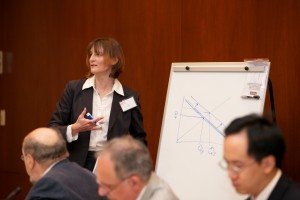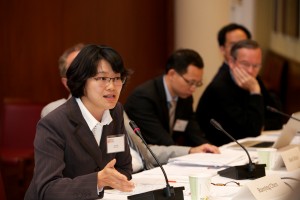On November 14th and 15th, CLI hosted a symposium on property rights, Spontaneous Order and Emergence of New Systems of Property. The symposium hosted leading scholars from fields in law and economics as they presented works in progress on the emergence of spontaneous property rights systems, with special emphasis on the United States and China. A range of issues were covered, including property customs, social norms and property, and the numerus clausus principle.

The papers from this conference were published in special issue of the Iowa Law Review (Volume 100, Issue 6). The articles are available here.
Video recordings of each session are available below.
Friday, November 14
9:00-9:45am Session 1: Richard Brooks, “Legal Landmarks”
9:45-10:30am Session 2: Lee Fennell, “Slicing Spontaneity”
11:00-11:45am Session 3: Shitong Qiao & Frank Upham, “Chinese Small Property: A Network Story of Spontaneous Order”
11:45-12:30pm Session 4: Ruoying Chen, “Invited Takings – Supermajority, Assembly Surplus and Local Public Financing”
2:00-2:45pm Session 5: Lee Alston & Bernardo Mueller, “Towards a More Evolutionary Theory of Property Rights”
2:45-3:30pm Session 6: Richard Epstein, “When Is the Spontaneous Formation and Evolution of Property Rights Possible”
4:00-4:45pm Session 7: Gary Libecap, “Endogenous First-Possession Property Rights in Open-Access Resources” (co-authored with Bryan Leonard)
4:45-5:30pm Session 8: Karen Bradshaw & Dean Lueck, “Contracting for Control of Landscapes”
Saturday, November 15
9:00-9:45am Session 9: James Fenske, “1807: Economic shocks, conflict and the slave trade”
9:45-10:30am Session 10: Emily Kadens, “The Dark Side of Private Ordering”
11:00-11:45am Session 11: Fernando Gomez, “Conflicts of Entitlements in Property Law: The Complexity and Monotonicity of Rules” (co-authored with Georg von Wangenheim)
11:45-12:30pm Session 12: Yun-Chien Chang & Henry Smith, “The Numerus Clausus Principle, Property Customs, and the Emergence of New Property Forms”
12:30-12:45pm Closing Remarks


